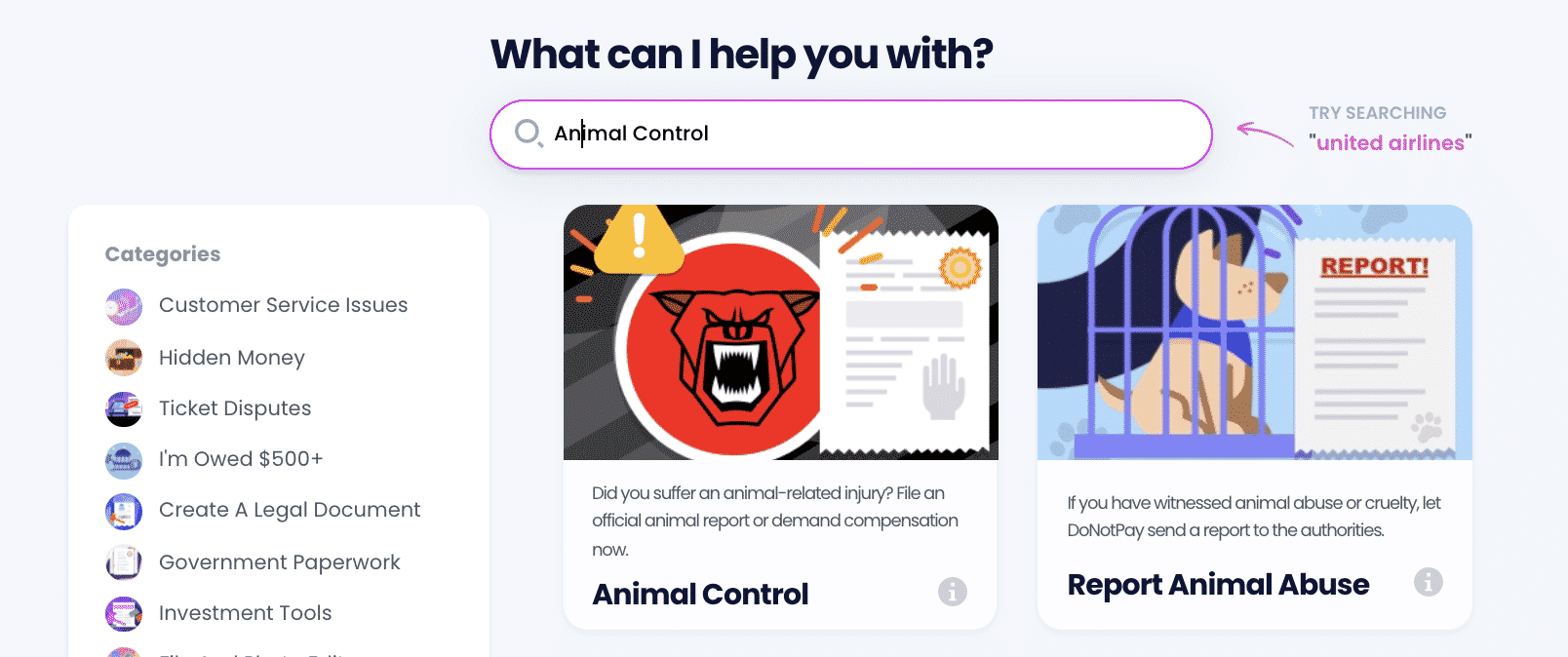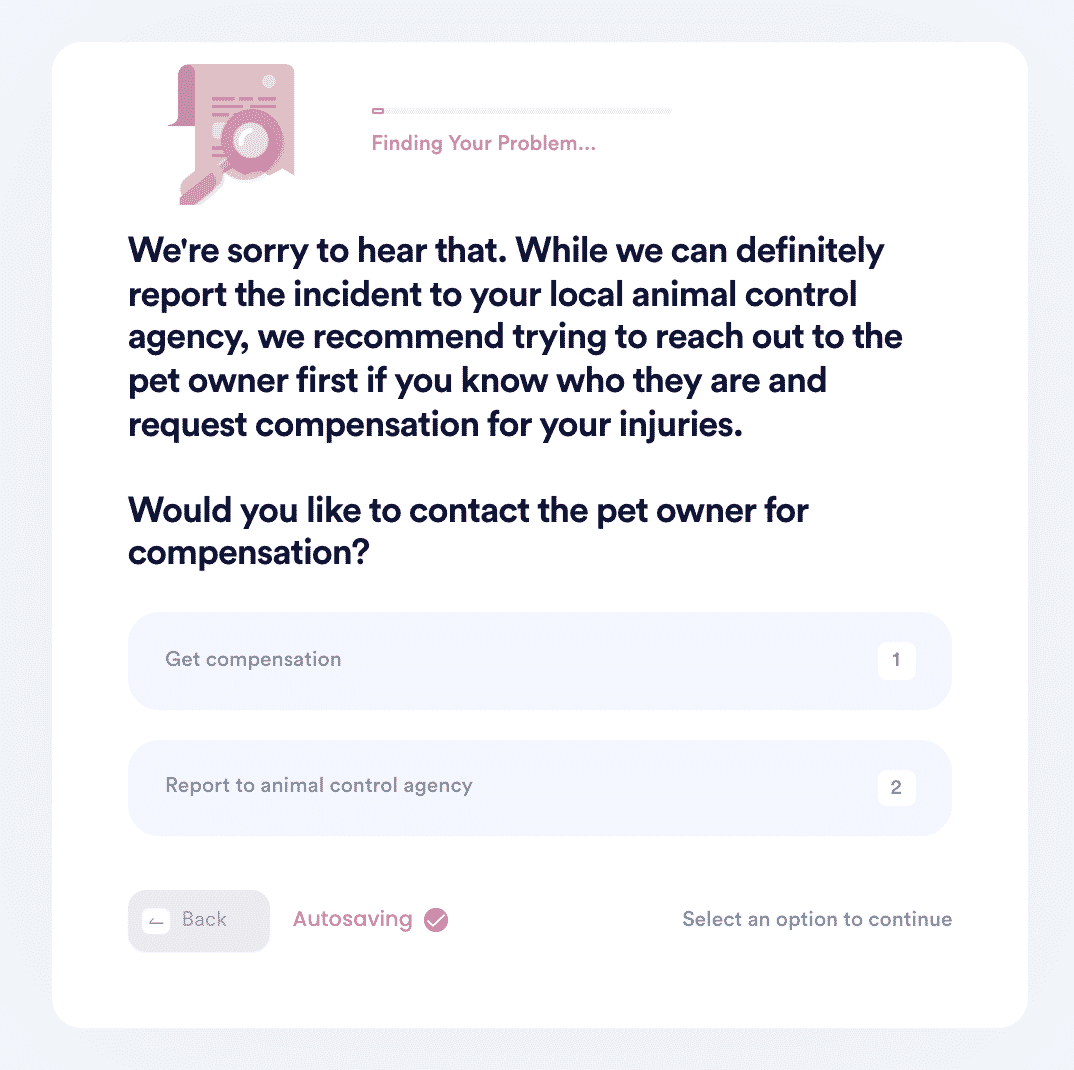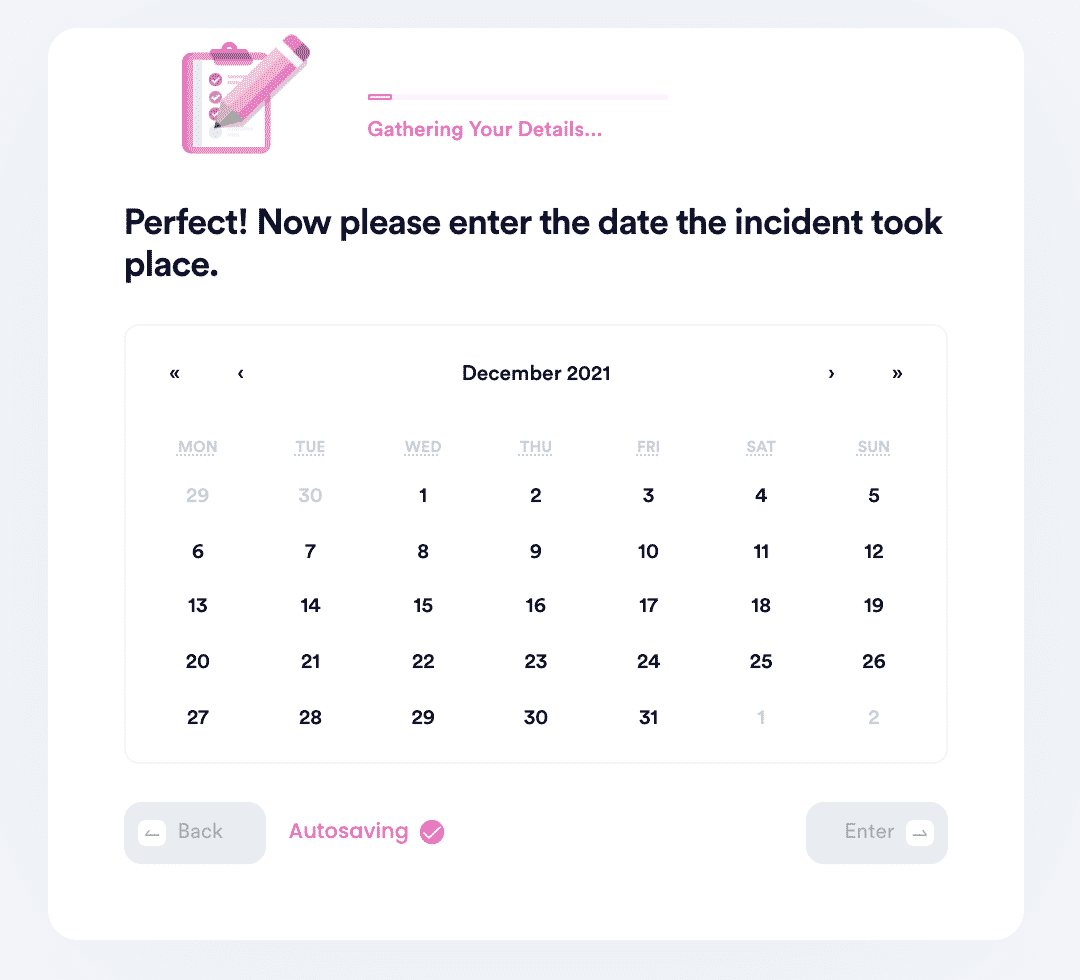Taking a Stand Against Dog Bite Injuries
As much as we love our dogs, there's no denying the fact that they sometimes bite the hand that feeds them. According to statistics from the CDC, more than 4.5 million dog bites occur in the U.S. every year. Of those, 800,000 require medical treatment.
So, what should you do if you're bitten by a dog? How do you go about — and to whom? Here's some guidance in case you find yourself on the wrong side of a dog's teeth.
Remember all of those deaths from dog attacks? If you're concerned about an aggressive dog in your neighborhood, you should definitely file an official complaint with your local animal control office.
It's not an easy process, but the life you save could be that of a child or an elderly neighbor. It might even be your own. Fortunately, DoNotPay can make the entire dog bite reporting process a lot easier. With DNP, there's no reason not to report that vicious dog.
What to Do After a Dog Bite
First, get to a safe place in order to avoid a repeat attack. While you're retreating, try to make a mental note of the dog's description (size, color, markings, type of coat, etc.) Also, note the direction it was heading the last time you saw it.
It's difficult to think clearly when you've just been attacked, but the more information you can provide, the better the chance that the right dog will get caught. This is vital in the case of a feral or stray dog that might be carrying the deadly rabies virus. It's also essential in getting the dog's owner to pay medical bills you may incur as a result of the bite or other injury.
The Cleveland Clinic recommends that you see a doctor after an injury from a dog. Even an accidental nip or scratch that occurs during play can develop a serious infection without the proper treatment.
Follow These Six Steps After a Dog Bite:
- Wash the wound out with mild soap and warm, running water for at least 5 minutes.
- Apply an over-the-counter antibiotic cream if possible.
- Bandage the wound if necessary to stop the bleeding.
- See a doctor within eight hours to avoid a potentially life-threatening infection.
- Follow the doctor's instructions regarding wound care.
- Watch for any signs of infection, such as redness, swelling, fever, discharge, or increased pain.
Once you're safe and your wound has been treated, it's time to file an animal injury report.
Filing a Dog Bite Report
Even mild injuries should be reported to the police or animal control authorities. So, too, should act of aggression on the part of a dog. What starts as a nip or mildly aggressive behavior can quickly escalate into potentially life-threatening situations unless it's nipped in the bud. Documenting an injury or close call provides authorities with the paper trail they need in order to take action before something tragic happens.
This official documentation is also vital if you have to resort to action against the dog's owner. It's an unfortunate fact that not everyone who owns a dog is responsible enough to willingly pay for the damage their dog causes. If they were, they would train their pet to behave and avoid these types of situations in the first place.
Bites Aren't the Only Possible Dog-Inflicted Damages
- An out-of-control dog jumping on you can inflict deep, painful scratches that can lead to a potentially serious infection.
- You may injure yourself while trying to avoid a charging dog
- Wielding an expensive bag or another object in an attempt to fend off a boisterous or aggressive dog can result in a substantial monetary loss
Do You Know How and Where to Report a Dog Attack on Your Own?
Different cities, counties, and states across the country all have their own animal control laws and reporting procedures. Trying to find the right place and manner in which to can seem overwhelming, especially when you're still suffering from the physical and emotional trauma of an attack.
You'll Need These Details for a Dog Attack Report:
- The date, time, and location where the attack took place.
- A description of the dog.
- Details of your injuries, including medical reports and photographs of any wounds
- The treating physician's name and contact information
- The cost of any current or expected medical treatment
- The name, address, and contact information of the pet's owner (if known)
Note: Injuries may not be clearly visible until a day or so later. Taking photos immediately and then repeating them over the course of several days will document the full extent of the physical damage you suffered.
Fortunately, you don't have to deal with this all on your own. You can choose an easy, successful method of dealing with animal incidents instead. It's called DoNotPay, and you'll be surprised at how well it works.
How to Report an Animal-Related Incident on DoNotPay:
If you want to report an animal-related injury but don't know where to start, DoNotPay has you covered in three easy steps:
- Search "animal" on DoNotPay, find the Animal Control product, and select whether you've sustained a physical injury.

- Select whether you would like to report this incident to your local government agency or demand compensation from the pet owner.

- Tell us more about the incident, including when and where you were injured, a description of the animal that caused the injury, and the contact information for the pet owner (if known).

DoNotPay will send a demand letter to the animal's owner or report the incident on your behalf, depending upon the option you choose.
DoNotPay Offers Help for Specific Areas of the Country
Below are just seven examples of the many cities and states across the country where DoNotPay can help you file an animal injury report.
| California | Miami |
| Ohio | Pennsylvania |
| Los Angeles | Texas |
When you trust DoNotPay to handle your dog bite or other animal injury report, you can rest easy knowing that the process is quick, simple, and reliable.


